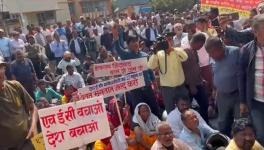Repression, Duplicity and 500 Days of Protest: Brewery Workers Stand United
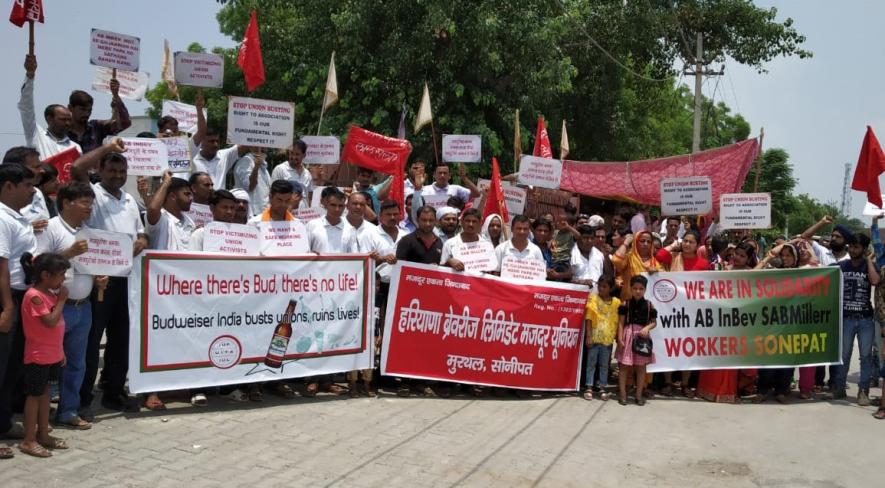
July 7 marked the 500th day of uninterrupted protest by the workers of AB InBev's Budweiser plant in Sonipat, under the banner of Haryana Breweries Ltd. Mazdoor Union (HBMU).
Their grievances include termination of union leaders, withdrawal of union recognition, Bhartiya Mazdoor Sangh’s (BMS) duplicity and AB InBev management’s refusal to negotiate on the demands of the union.
In a press note released on July 8, the independent union declared that the workers will continue their demonstration to put pressure on the management to stop the selective victimisation of the union members and reinstate the terminated union committee members – who were, according to the union, fired by the management three years ago through illegal means.
The Sonipat brewery plant of Anheuser-Busch (AB InBev) – the Belgian-Brazilian company and world’s biggest beer producer – is one of the 17 units that are operated by the company in India. The company is the owner of well over 500 beer brands, most famous of which in India are Budweiser and Corona.
The brewery plant was originally owned by the Haryana government, which was disinvested and was bought, in 1992, by another beer-producing company named SABMiller Plc. In 2015, after a merger of SABMiller Plc and AB InBev, the plant eventually came under the management of AB InBev India.
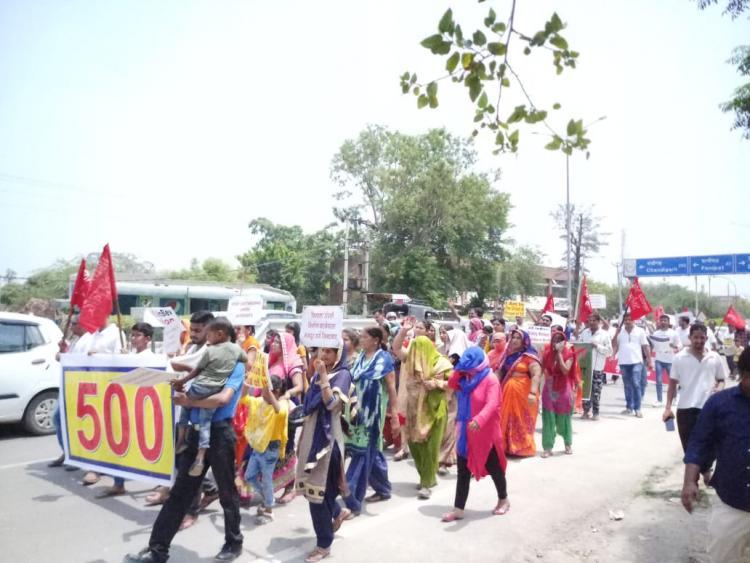
In the past, the permanent workers of the Sonipat brewery plant have raised serious objections on getting paid less in comparison to the workers in different units, despite doing the same amount of work.
According to one of the members of the union, for same working hours, a permanent worker in Sonipat brewery plant would earn around Rs 20,000 per month, which is half of what a permanent worker in Aurangabad brewery plant would earn.
This was mainly because of the presence of the unions in those brewery plants who would often negotiate the terms on which the salary of a worker will be fixed, he added.
Taking cognisance of the failure of addressing workers’ issues, the permanent workers, in 2016, decided to revive the trade union which was active during the Haryana government’s ownership. The workers paid the union fee and completed all the required steps and got the union re-registered under the same name as HBMU and same union numbers.
The AB InBev’s management, however, refused to recognise the union and removed six people – out of which, four were terminated, and two were suspended – including some of the union leaders.
NewsClick spoke to Deshraj Yadav, the then general secretary of the union, who shared how he was removed by the management based on charges that were fictitious. He commented that the management alleged that the documents pertaining to his education qualifications do not comply with the norms of the company.
According to him, SABMiller Plc had a policy of providing promotion to the permanent workers who attain minimum required education qualification and pass a technical test. In 2015, after the merger, the policy was dropped by AB InBev India which was, however, later reinstated when the workers decided to form a union and further their interests against the decisions taken by the AB InBev India’s management.
“I was selected as one of the seven workers for promotions,” Yadav said, “When I denied the promotion offer, since I was then also appointed as general secretary of the recently revived union, the management, in retaliation, terminated me on the charges of fraud by claiming that the education degree that I submitted was not from a UGC or AICTE-affiliated college. The other six workers who submitted degrees from same college were promoted.”
As of now, four people, including the then general secretary and president of the union, are terminated by the management, demonstrations against which have been going on since past 500 days.
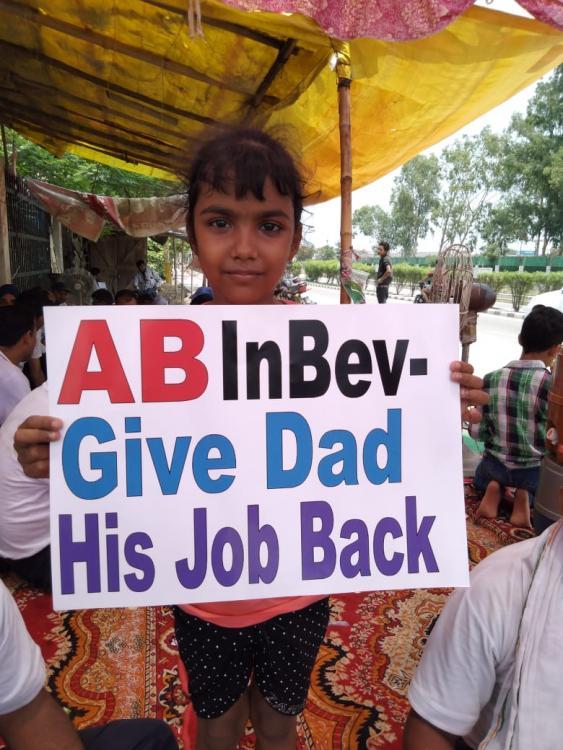
In addition to this, members of the union also feel betrayed by the Bhartiya Mazdoor Sangh (BMS) – a RSS-backed trade union.
With BJP party ruling in state’s legislative Assembly, in 2016, the members of HBMU decided to seek affiliation from BMS.
However, as told by Yadav to NewsClick, only one year later, BMS joined hands with the management and eventually played a major role in breaking the unity of HBMU members.
Karan Singh Rana, former president of BMS Haryana, was a legal advisor to the committee of HBMU, who eventually teamed up with the management and conducted parallel elections with only seven permanent workers, without even informing the committee, added Yadav.
Yadav criticised the management for recognising the union then formed – with only 22 permanent members – through parallel elections and not recognising the independent HBMU union which, according to him, has more members – around 60 – and has democratically elected its leaders who are committed to the idea of furthering the workers’ cause.
Over the years, the management escalated its attacks on the workers who have participated in the protests. Last year, in April, management reportedly orchestrated a physical attack on a peaceful union protest outside Sonipat government office in which a union committee member was seriously injured. A “false” police complaint for alleged assault was then filed against union members only by the management which resulted in the arrest of the union leadership. The arrested leaders are currently free on bail. In an attempt to harass the individuals, around 12 such “false” cases have been registered against the union and its members.
Despite all the anti-union tactics of a global brewing company to repress the protest, the independent HBMU has been able to secure support from the International Union of Food, Agricultural, Hotel, Restaurant, Catering, Tobacco and Allied Workers' Associations (IUF) – an international federation of trade unions – which has helped the struggle to get attention at an international level as well.
IUF is currently representing HBMU in a case filed in the Belgium courts of OECD Watch – a global network that forms guidelines for multinational enterprises regarding the business conduct in their worldwide operations – against the AB InBev India.
The plant currently operates for full 24 hours a day and the permanent workers are divided in three shifts while the contract workers, who are in majority, are divided in two shifts.
A permanent worker completes his shift and then joins the protesting group for another four hours, where his family members would already be sitting, thus making the protest last for 12 hours every day since past 500 days. Though earning significantly lesser than permanent workers, contract workers who are hired through third-party labour agencies, due to the fear of losing jobs, could not participate in the protest.
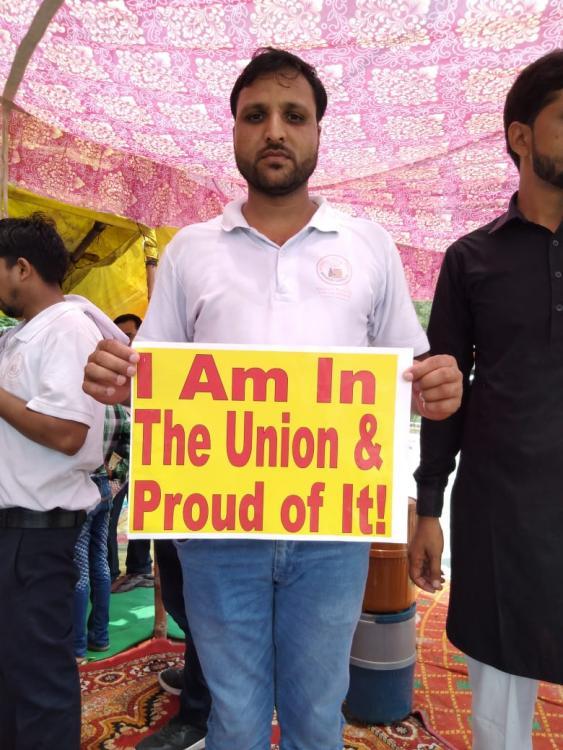
While the management has shown total indifference to the demands of its own workers, the protest has received noteworthy support from the local kisan and students’ unions, creating an admirable example of a community coming together to provide strength to the struggles of individuals who are one of their own.
Get the latest reports & analysis with people's perspective on Protests, movements & deep analytical videos, discussions of the current affairs in your Telegram app. Subscribe to NewsClick's Telegram channel & get Real-Time updates on stories, as they get published on our website.











